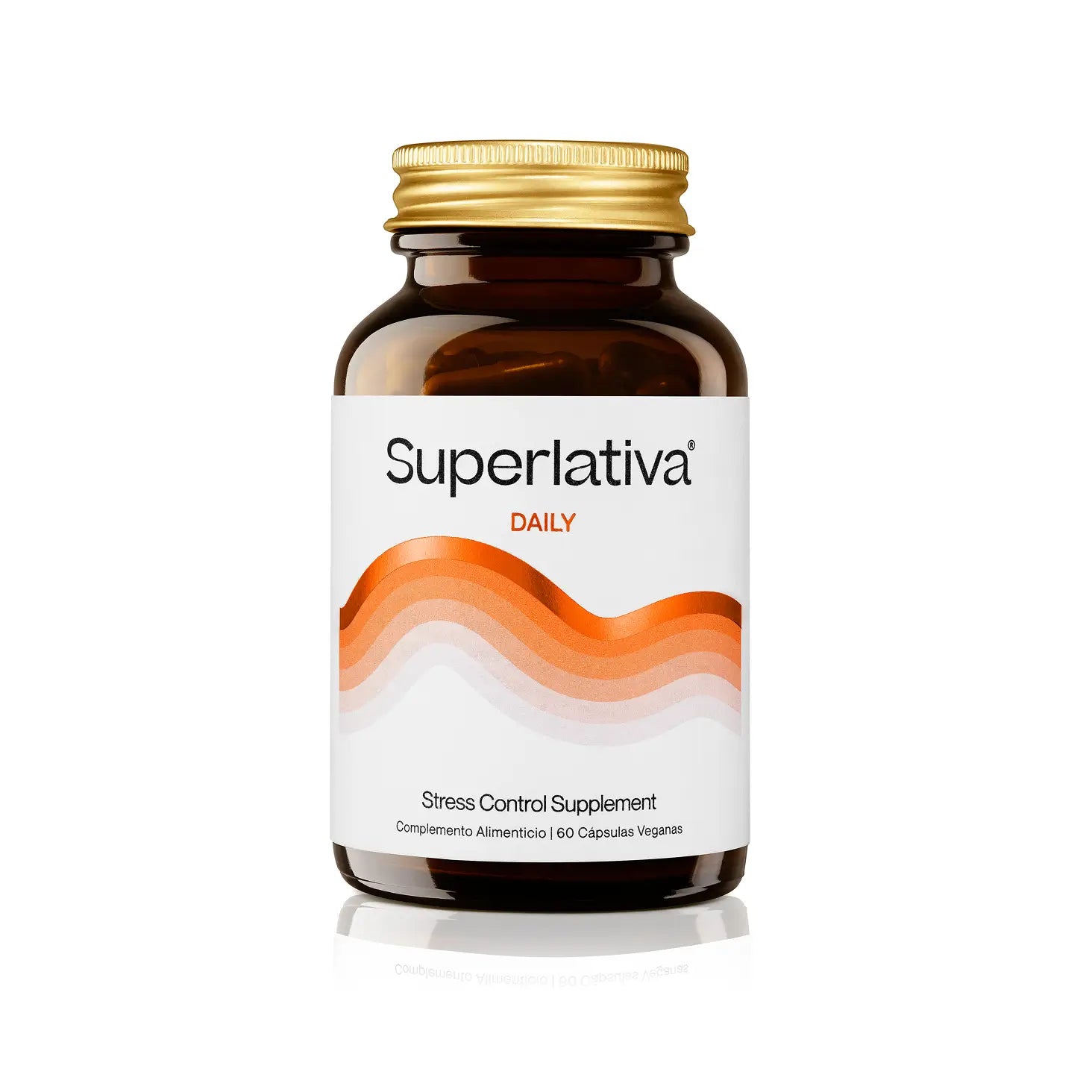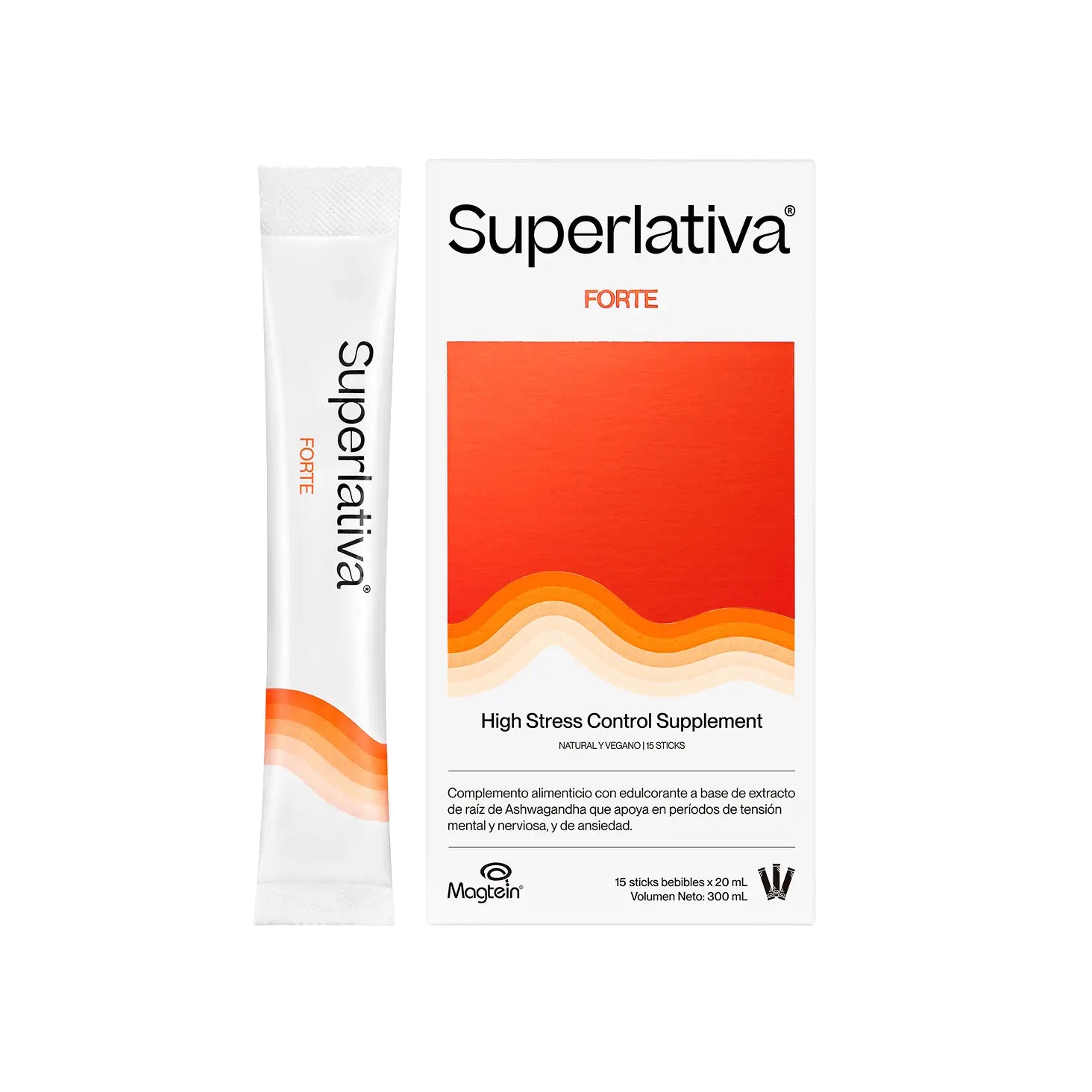By Laura Llacuna, Ph.D., Medical Advisor at Superlative
Cortisol is an essential hormone for body balance, but when it remains elevated steadily, it can disrupt key functions such as sleep and digestion. This guide provides essential information to understand its impact and how to regulate it naturally and effectively.
What is cortisol?
Cortisol is a steroid hormone, specifically a glucocorticoid, produced by the adrenal glands. Its main function is to help us respond to physical or emotional stress, and its release is regulated by the hypothalamic-pituitary-adrenal (HPA) axis .
When the brain detects a stressful situation, the hypothalamus secretes CRH (corticotropin-releasing hormone), which stimulates the pituitary gland to release ACTH (adrenocorticotropic hormone). This signal travels through the bloodstream to the adrenal glands, where it triggers cortisol production.
Cortisol follows a natural rhythm, called the circadian rhythm : its levels increase upon waking to mobilize energy after the night's fast, and progressively decrease throughout the day.
Furthermore, it's a key hormone in dangerous situations. In the face of a real threat—such as an accident or emergency—cortisol rises rapidly, triggering the release of adrenaline and preparing the body to act. The problem isn't cortisol itself, but rather its sustained excess .
When cortisol levels remain elevated without a real threat (for example, during prolonged periods of worry, insecurity, or emotional overload), the body enters a state of chronic alarm . This can lead to what we call "cortisol poisoning," the effects of which are multiple: insomnia, persistent inflammation, hormonal imbalances, insulin resistance, weight gain, and increased vulnerability to neurodegenerative diseases, among others.
Today we know that chronic stress—and therefore excess cortisol—is one of the main causes of health decline in modern life.
Cortisol and stress, how they relate
Feeling stressed in certain situations is normal and helpful. It helps us stay alert and react to certain situations. This type of acute, transient stress is part of our physiology and, in small doses, is not harmful.
However, when stress becomes constant and persists for weeks or months, we speak of chronic stress . In this state, the body remains on constant alert, with elevated cortisol levels that ultimately affect various vital functions.
Symptoms of chronic stress vary, but often include:
-
Difficulty concentrating or thinking clearly
-
Constant irritability
-
Sleep disorders
-
Hair loss
-
Digestive discomfort
-
Allergy flare-ups or inflammatory diseases
The link between stress and cortisol is direct: the more sustained stress we experience, the more the HPA axis is activated, and the more cortisol is released. This overstimulation takes a heavy toll on the body, especially when there are no breaks for recovery.
Excess cortisol and rest
The circadian rhythm , which regulates our states of wakefulness and sleep, is closely linked to cortisol. This hormone should peak in the morning (to energize us) and gradually decrease throughout the day, allowing for rest at night.
However, when we go through periods of high stress, this rhythm is disrupted. The brain interprets the situation as a constant threat and maintains alertness, releasing cortisol at times when it should decrease, such as in the afternoon or even early morning.
At this stage, many people notice that:
-
They wake up already tired
-
They maintain a constant feeling of fatigue
-
Despite being exhausted, they are unable to sleep at night.
This pattern is a response to a disorder of the HPA axis. Initially, the body can sustain excess cortisol. But over time, levels become depleted or dysregulated, and we enter a resistance phase , where cortisol fails to activate in the morning, but does so, inadequately, at night.
If this situation continues, the system ends up collapsing and chronic fatigue appears , a state of physical, emotional and mental exhaustion that requires deeper intervention.
5 habits to reduce your cortisol levels
Small, sustainable changes can have a big impact on your hormonal balance. Here are five science-backed practices that will help you regulate cortisol naturally:
-
Sunlight in the morning : Exposing yourself to sunlight early in the day synchronizes your biological clock. Natural light activates photoreceptors in the skin and retina, which stimulates cortisol production at the appropriate time and facilitates the nocturnal synthesis of melatonin , the sleep hormone.
Go for a 5-10 minute walk every morning, without sunglasses or sunscreen on your face and hands. Also, avoid screens and artificial white light after 9 p.m. to avoid interfering with this cycle. -
Protein intake in the morning : Melatonin is formed from serotonin, which is synthesized by an essential amino acid: tryptophan . The tryptophan found in proteins (meat, fish, eggs, legumes) produces melatonin, the hormone that helps us sleep and rest.
But the protein we eat at night doesn't help us produce melatonin, since the immune system is active at night and needs to consume tryptophan. On the other hand, if we eat protein in the morning, when the immune system is calm, we'll have this tryptophan available for the production of serotonin and melatonin. Therefore, if you fast, it's better to fast at night than in the morning.
-
Regular physical exercise: Movement is one of the most effective regulators of cortisol. It improves mood, reduces anxiety, and promotes more restful sleep. Exercise improves overall health and a sense of well-being.
Choose an activity you enjoy and practice it regularly, without seeking performance: walking, swimming, dancing, or yoga are excellent options.
-
Contact with nature : Tuning in to nature will help us connect with the natural rhythm of life. Trees don't grow in a hurry; they grow slowly, calmly. The vibrations that come with being in contact with nature lower cortisol levels and bring us calm.
Walking barefoot on the beach, strolling among the trees, hugging a tree and feeling its stability will bring you a vibration of peace and serenity.
-
Take adaptogens: Adaptogenic plants are useful for many ailments, although they are most notable for their ability to modulate the hypothalamus-pituitary-adrenal axis. Among their benefits, we know that they allow the body to better adapt to certain situations of physical or emotional stress and protect us from the harmful effects resulting from them.
Ashwagandha is one of the most studied and widely used adaptogens for reducing stress, anxiety, and depression. Taking an Ashwagandha supplement, such as Superlativa Daily, is an easy and effective way to reduce cortisol levels and start feeling better. We recommend taking two capsules in the morning. Contraindicated during pregnancy, breastfeeding, or if you are taking medication for high blood pressure.
Learn to regulate your cortisol
It's not about adding more obligations or living a life full of restrictions. Regulating cortisol starts with living better , not doing more.
Choose a diet based on 100% real food (fresh, natural products), sleep at your natural rhythm, move with pleasure, and find spaces to connect with what makes you feel good. It's not about seeking perfection, but balance .
Small, sustainable habits can restore the body's ability to self-regulate. And when the body finds that rhythm, everything feels a little calmer.









